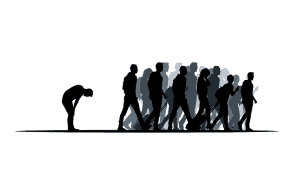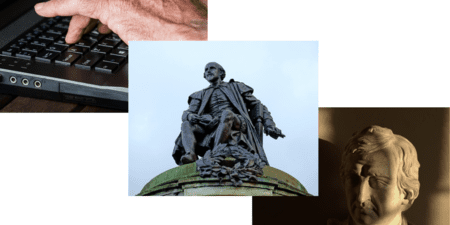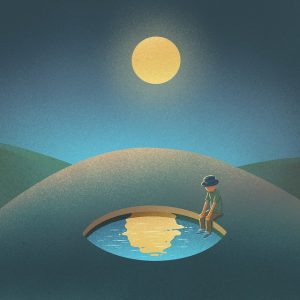I once learnt how Not To confuse an author/writer with a poet. Do you want to know how to tell the difference? … I thought you were curious.
It’s in the way they say hello. They always answer the same. Yes, they always say, “Hi, hey, haven’t we metaphor?”
Okay, okay, I will stop. You really had a serious face there. I just have to imagine it, after all, I am a writer.
Have you ever heard the saying; all poets are writers but not all writers are poets? This is why questions around this topic have been so popular that I have decided to address it in how not to confuse an author/writer with a poet.
An author/writer is a creator of one or several pieces of work; literary composition while a poet writes prose artfully.
This is an essential question that kept on coming up over the years, and one that should be taken into account. Here are the reasons why:
The poet
1) Writes prose artfully. The mixing up of words creates emotions poetically/rhythmically. The combination of poetic devices makes poetry rich bringing out sound artfully (sound devices).
The use of anaphora, enjambment, consonance, euphony, conceit, apostrophe, metonymy, synecdoche, end-stopped lines, zeugma, repetition, alliteration, internal and end rhyme, consonance and assonance, imagery, euphony and cacophony, and meter are devices which I will go into on in another lesson on writing. Now that these devices have been mentioned this helps one to identify how not to confuse an author/writer with a poet. These devices can be easily confused with literary devices.
2) Has no rules, in fact, poetry is like art.
A poet can break rules in poetry, they can make the poem or prose so artful that it sends so many emotions, visions, sound vibrations to the reader almost like creating a new dish, a new piece of art every time the poet creates something new and innovative there is a signature that is unique to that specific poet. The artist Salvador Dali signature was the word Gala in some of his paintings, even the images of bones, symbols of death seem to appear in his paintings. Dali was a surrealist painter who was known to be extravagant. Just another detail, Gala was a poet’s daughter, now you see…
3) Can create a short scene even a story artfully yet rhythmically in a poem, stanza or verse.
This point is straight out obvious on how not to confuse an author/writer with a poet. Using the 12 devices achieving visualisation the poet can weave the poem, stanza or verse in such a way that the reader could be dazzled for hours, and at the poet for a lifetime.
4) Has to transfer their point over strategically, quickly and artfully to the reader.
The poet can take the same amount of time as an author/writer to position the point that they are transferring over to the reader through a poetical sense, depending on how artful and genius they wish to make it. This can take anywhere from 15 minutes, 2 hours, 4 hours or even longer.
5) Imagination is limited which will either make it or not make it a short piece of genius.
The thought that goes into creating a poem, stanza or verse as mentioned above can go anywhere from 10, 15 minutes, 2 hours, 4 hours or longer, but imagining stops there, and the limitation of words keep the taste of that piece of imagination through rhythm and the use of devices alive. The genius in it decides how memorable it will be.
The author/writer
1) Description, storytelling, grammar, punctuation, passive voice, active voice and elements of the English language are used to word the characters, setting, and plot.
The use of metaphor, simile, imagery, symbolism, personification, hyperbole, irony, juxtaposition, paradox, allusion, allegory, ekphrasis, onomatopoeia, and pun is usually what literary works are comprised of, these are literary devices which I will go into in another lesson on writing.
2) Has a lot of rules
In order to create compelling arguments, visualising the characters, putting it in order, to construct the string of sentences, the paragraphs and chapters there are general rules to be followed such as the parts required to form a story, or where to use the passive or active voice. Careful though, planning and strategy would be required to achieve the final goal. No author wants to lose the reader especially when a lot has gone into capturing their attention. Quality writing is required to earn the reader’s attention.
 4) Takes more literary effort to acquire the attention of the reader.
4) Takes more literary effort to acquire the attention of the reader.
This point is straight out obvious on how not to confuse an author/writer with a poet. For the reader to read or stay for longer the author/writer could take pages, or even chapters before the reader puts the book down or to complete reading the piece of content.
5) Can take their time to transfer their point over to the reader positioning the story through their own formula/way.
The author/writer can choose how to deliver the story through their own genius as they formulate the complot of the story through their own strategy through a short story, a piece of content or a book. He/she can take their time, shorten the size, or the number of pages if they think that is where and how they should end it.
6) Imagination has to be stretched and the genius is in keeping the reader glued.
The author/writer like J. K Rowling puts it, was limited to the school and the grounds, she had to keep stretching her imagination even when she wrote Fantastic Beasts. Fantastic Beasts allowed her to write past the school walls compared to the Harry Potter series. Fantastic Beasts allowed the story of magic to become a political concept using the world in her story.
How not to confuse an author/writer to a poet even though a poet is a subset of an author/writer but not quite that is why they are called poets, confusing right?
I hope I have done my job as a writer well here and glued you to this article I mean I just don’t know which poets are gathering here right now and from which nationalities.
I mean we are in the month of March past Valentine’s Day. Any French poets here? I am sure you must be saying, “I will die for love.” Any English poets here? I am certain you are saying, “I will die for honour.” Any American poets here? I guess you are saying, “I will die for freedom,” and if you are a Russian poet here, you’re most definitely saying, “I will die.”
Okay, okay, I know it’s terrible all these writing jokes that I have picked up over time. Okay, now I am serious. Seriously, serious.
Did you know that in Bruce Wayne’s later years he retired and became a famous poet? Yes, I already watched the latest Batman movie that you have no idea is soon to come out. Don’t watch it, it’s not worth it.
Apparently, he went from bat to verse.
I shall make my departure now. Look out for my next article where we will go into the devices of poetry which will help you see in detail how not to confuse an author/writer with a poet.
You can also have a look at How not to confuse an author / writer with a poet short video.
Drop us a comment below and follow us or share this article on Instagram, Tiktok, Facebook.
Yours sincerely,
T. Dench Patel











